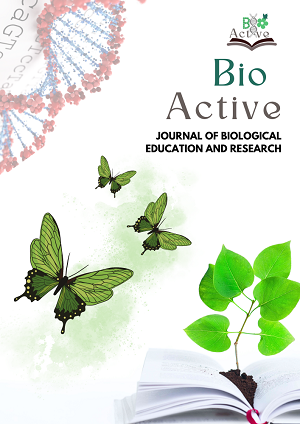IMPLEMENTING THE INQUIRY LEARING MODEL AND SCIENTIFIC APPROACH TO BUILD CONCEPTUAL UNDERSTANDING ON THE TOPIC OF ANIMALS AND PLANTS IN GRADE 1 PRIMARY
Kata Kunci:
inquiry-based learning, critical thinking, formative assessment, scientific approach, inclusive classroomAbstrak
This study aims to analyze the implementation of the inquiry-based learning model to improve critical thinking skills of Grade 1 elementary school students in the topic of animals and plants within the Natural and Social Sciences (IPAS) subject. The scientific approach was systematically integrated to facilitate observation, questioning, reasoning, and communication based on real-life experiences. A descriptive qualitative method was employed, involving 28 students from an inclusive Christian elementary school in Bogor. Data were collected through observation, interviews, documentation, and formative assessments. Results showed that 70.37% of students achieved scores that met or exceeded the Minimum Mastery Criteria. The formative assessments consisted of two parts—verbal and visual tasks—which provided a comprehensive picture of students’ conceptual understanding and critical thinking skills. The inquiry approach also fostered character development, especially responsibility and care for God's creation. The study recommends the use of differentiated instruction and reflective strategies to address diverse learning needs in inclusive classroom settings.
Referensi
Azmi, I., Prasetya, D. S. B., & Sabrun, S. (2025). Profil Berpikir Kritis Siswa SMP pada Mata Pelajaran IPA. Journal of Classroom Action Research, 7(Vol. 7 No. 1 (2025): Februari 2025), 163–175. https://doi.org/10.29303/jcar.v7i1.10570
Bogdan, R. C., & Biklen, S. K. (2007). Qualitative Research for Education: An Introduction to Theories and Methods. Pearson Education.
Boud, D., Keogh, R., & Walker, D. (2013). Reflection: Turning experience into learning. Routledge.
Brummelen, H. Van. (2009). Berjalan dengan Tuhan di dalam Kelas. Universitas Pelita Harapan.
Chen, C.-M., Wang, C.-H., & Lin, Y.-C. (2020). Effects of learning styles on learning achievement in mobile learning environments. Interactive Learning Environments, 28(1), 1–17. https://doi.org/10.1080/10494820.2018.1528288
Creswell, J. W., & Poth, C. N. (2018). Qualitative Inquiry and Research Design: Choosing Among Five Approaches (4th ed.). Sage Publications.
Ennis, R. H. (2011). The Nature of Critical Thinking: An Outline of Critical Thinking Dispositions and Abilities.
Harlen, W. (2013). Assessment & Inquiry-Based Science Education: Issues in policy and practice. Global Network of Science Academies. https://www.interacademies.org/publication/assessment-and-inquiry-based-science-education
Herwinarso, H., Koswojo, J., Lestari, T., Untung, B., Winata, S. W., Kristiawan, Y., & Pratidha, E. (2024). Pendampingan Eksperimen Fisika Bagi Peserta Didik SMA di Surabaya. Jurnal Abdimas Indonesia, 4, 760–766. https://doi.org/https://doi.org/10.53769/jai.v4i3.762
Hidayati, H. (2022). Belajar Pembelajaran Dalam Metode Ceramah. https://doi.org/10.31237/osf.io/hnfys
Ibda, F. (2015). Perkembangan Kognitif: Teori Jean Piaget. https://media.neliti.com/media/publications/242904-perkembangan-kognitif-teori-jean-piaget-48e0bd89.pdf
Koskela, A., & Palukka, H. (2011). Roles, identities and emotions in learning and professional growth. Studies in Continuing Education, 33(3), 271–285. https://doi.org/10.1080/0158037X.2011.610301
Miles, M. B., Huberman, A. M., & Saldaña, J. (2014). Qualitative Data Analysis: A Methods Sourcebook (3rd ed.). Sage Publications.
Murdoch, K. (2015). The Power of Inquiry: Teaching and Learning with Curiosity, Creativity and Purpose in the Contemporary Classroom. Seastar Education.
Mustafo, H., Jazeri, M., & Mu’awanah, E. (2021). STRATEGI PEMBELAJARAN SCAFFOLDING DALAM MEMBENTUK KEMANDIRIAN BELAJAR SISWA. AL FATIH: Jurnal Manajemen Pendidikan Islam, 1. https://journal.an-nur.ac.id/index.php/ALF/article/view/29
Mustofa, M., & Mariati, P. (2023). Implementasi Kurikulum Merdeka Belajar di Sekolah Dasar: Dari Teori ke Praktis. Indonesia Berdaya, 1, 13–18. https://doi.org/https://doi.org/10.47679/ib.2023371
Nurhidayati, I., Taufik, M., & Maolani, F. N. (2022). Authentic Assessment in Inquiry-Based Learning to Improve Students’ Scientific Literacy. Jurnal Pendidikan IPA Indonesia, 11(1), 43–52. https://doi.org/10.15294/jpii.v11i1.28229
Puling, H., Manilang, E., & Lawalata, M. (2024). Logika dan Berpikir Kritis : Hubungan dan Dampak Dalam Pengambilan Keputusan. Jurnal Sinar Kasih, 2, 164–173. https://doi.org/https://doi.org/10.55606/sinarkasih.v2i2.319
Sudibjo, N., & Handayani, M. M. I. (2017). Penerapan Pendekatan Pembelajaran Inkuiri Terstruktur Untuk Meningkatkan Kompetensi Keterampilan Koneksi Matematis, Memecahkan Masalah, dan Komunikasi Matematis. Jurnal Teknologi Pendidikan, 2, 144–129. https://download.garuda.kemdikbud.go.id/article.php?article=906885&val=14281&title=Penerapan%20Pendekatan%20Pembelajaran%20Inkuiri%20Terstruktur%20Untuk%20Meningkatkan%20Kompetensi%20Keterampilan%20Koneksi%20Matematis%20Memecahkan%20Masalah%20dan%20Komunikasi%20Matematis
Tomlinson, C. A. (2014). The Differentiated Classroom: Responding to the Needs of All Learners (2nd ed.). ASCD.
Tung, S. K. (2016). Educating for Shalom: Essays on Christian Higher Education. Dordt College Press.
Zohar, A., & Dori, Y. J. (2012). Metacognition in Science Education: Trends in Current Research. Dalam Contemporary Trends and Issues in Science Education (Vol. 40, hlm. 73–96). Springer. https://doi.org/10.1007/978-94-007-2132-6_5

Unduhan
Diterbitkan
Terbitan
Bagian
Lisensi
Hak Cipta (c) 2025 Dince Bunda, Agresif Theodora Nunciata Elvina Hulu

Artikel ini berlisensiCreative Commons Attribution-ShareAlike 4.0 International License.

.png)
.png)





